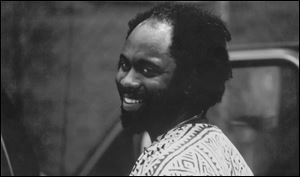
Revisiting the murder of Malcolm X
2/26/2013
Allen
Malcolm X’s brazen, spectacular murder in a crowded New York ballroom in 1965 never attracted the media or historical interest that other assassinations of the era have. But for me and countless other admirers around the world, the anniversary of his death this month is a day of mourning.
A newly updated book by journalist Peter Goldman, who interviewed Malcolm numerous times, puts the responsibility for the assassination on the Nation of Islam, which Malcolm had left. Mr. Goldman’s research provides an opportunity for the Nation’s top leaders to accept the organization’s role in Malcolm’s death, and to put to rest some of the conspiracy theories about it.
On the day of his death 48 years ago, the man who became the Sunni Muslim El-Hajj Malik El-Shabazz — a former street rebel and prison inmate turned visionary for black equality and human rights activist — announced his program for freedom in America at what would be his final appearance. He’d seen it coming.
“I’ll be dead Tuesday,” 39-year-old Malcolm had told a peer, explaining why he couldn’t accept a speaking engagement that would have occurred two days after he lay mortally wounded.
Malcolm had split with Nation of Islam leader Elijah Muhammad a year before, making known in interviews and speeches the bad blood that had developed between him and the man who rescued him from spiritual death 16 years earlier. Mr. Muhammad expelled Malcolm, angry that he had discussed the children his mentor fathered outside of marriage.
Mr. Goldman cites FBI surveillance records and documents to make the most compelling case yet that Malcolm’s spiritual father was also the man who sent him to his grave.
The author writes in the new edition of his acclaimed book The Death & Life of Malcolm X: “It was Mr. Muhammad who gave us Malcolm X, delivered him from a life of crime, and set him off on a ministry ultimately heard and honored around the world. But it is time now to acknowledge that it was Elijah Muhammad who, in the end, took Malcolm from us — who made it known to his followers in language they understood that he wanted his star pupil dead, and who chafed and nagged until, on Feb. 21, 1965, they finally got it done.”
The Nation of Islam has evolved, socially and politically, since Malcolm’s day. Yet whispers of complicity in its ex-spokesman’s death have long dogged the religion.
The Nation’s current leader, Louis Farrakhan, gave his most public response during a mid-1990s interview on 60 Minutes that followed an alleged revenge plot against him by Malcolm’s daughter Qubilah Shabazz. He told interviewer Mike Wallace: “Where our hands are a part of this, we beg God’s mercy and forgiveness.”
But aside from Mr. Farrakhan’s admission to creating a hateful, murderous climate, the Nation has never revealed the degree to which it was a part of Malcolm X’s killing, Mr. Goldman writes. Three men identified at trial as Nation members were convicted of firing the fatal gunshots, though Mr. Goldman argues that only one was guilty. Talmadge Hayer’s true fellow assassins, the author says, never have been punished.
“As Malcolm himself once put it,” he wrote, “orders in the Nation were handed down the chain-of-command as suggestions and were assigned to people who understood that suggestions were orders.”
Mr. Goldman cites one conversation intercepted by authorities as early as March, 1964, in which Mr. Muhammad is identified as saying: “The only way to stop him is to get rid of him the way Moses and the others did their bad ones … With these hypocrites, when you find them, cut their heads off.”
Malcolm’s assassination was delayed, Mr. Goldman writes, by his travel across Africa and Asia, where he embraced traditional Islam. His interaction with revolutionaries likely contributed to theories that the U.S. government had him eliminated. America’s racism, and the oppressive tactics the government then used against black revolutionaries, made such theories easy to believe.
Mr. Goldman did not update his book to indict Mr. Muhammad or to reveal a smoking gun. At age 80, he said he just wanted to finish the work he started 40 years ago.
Whether the Nation of Islam — which did not respond to my requests for comment — will use the book to set the record straight remains to be seen.
Eddie B. Allen, Jr., a former Blade staff writer, is a Detroit-based writer and author of Low Road: The Life and Legacy of Donald Goines.